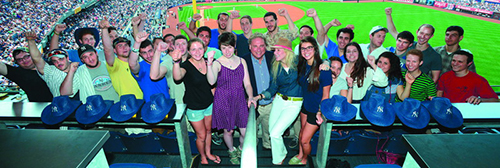



Highlighting: “Sam & Rita Newman: Survivor Stories,” by Avi Newman and Zev Newman. 2022. 331 pages. ISBN-13: 979-8445687658.
Zev Newman of New York City was so intrigued by his grandfather’s story of how he survived the Holocaust that he gathered interviews and decades of family photos and created a genealogy. With the help of family members, he developed a book that, for him, was “a way to document and preserve the history, bring the extended family together, and create something that could be passed down from generation to generation.”
With the number of survivors dwindling and the rise of antisemitism and Holocaust denial, there is an increased urgency to record these stories. Zev noted, “If we, the grandchildren of Holocaust survivors, don’t tell their stories and remember their vanished world, who will?”
The interview style of the book makes the reader feel as if Zev’s grandfather Sam Newman is sitting in the room discussing his experiences. The interviewer posed questions about life in the Carpathian Mountain shtetl before the war, the exile from their home to various cities, concentration camps and work detail, and finally, the post-war period and Sam’s arrival in the United States.
Zev said: “It’s been great hearing feedback from people who read the book and how they felt so connected to my grandfather as they read it. People have told me that they feel like they really got to know him.”
The humor and quick wit Sam uses with the interviewer speak volumes about his personality and the resilience necessary to create a life in a new country, learn a new language, and start a thriving company.
The hours-long interview shows many seemingly random acts that turn out to be interrelated. In a chance meeting of a sister in Auschwitz, Sam is given the advice to leave the camp any way he can. Sam volunteers for a work detail in a factory—a move that likely saved his life. Sam describes medical problems he had when he was young that kept him out of school for quite some time. Although he was never declared as “cured,” the illness never struck while he was in the camps. Such an illness would have sent him immediately to the gas chamber.
The nine-generation genealogical family tree shows the pre- and post-war family. Each current generation name listed is a proud accomplishment and story of survival. Family pictures help readers feel they are a part of the extended family they have gotten to know throughout reading the book.
Zev started working on the book during the COVID lockdown as a way to use some extra time in a productive manner. Other family members chipped in, and it became a family effort. “When we were creating the book, we were mainly doing it for our family,” he said. “We planned to send copies to our extended family and figured they would be the only ones interested. It turns out that a far wider audience is interested. We never expected to sell so many copies. It definitely helped that we put the book on Amazon.”
There have been benefits within the family as well. “When my father’s first cousin passed away, I paid a shiva call to his son. He told me that he had been bonding with his sister over the book while they sat shiva together; the book includes pictures of his father, z”l. That moment really touched me.”
Today Sam is 94 years old and has dementia, so the family isn’t sure how much he knows about the book. Zev is confident that “he [would be] happy to know that his story will be passed on from generation to generation and that his family members who perished during the Holocaust won’t be forgotten.”
He added: “It was such a gift that he did this eight-hour interview back in 2014. He spoke about very difficult moments in his life, which I’m sure wasn’t easy for him. There were moments when he cried during the interview, something I’ve never seen him do.”
With only one 45-minute interview of Zev’s late grandmother, Rita, there is only a short segment about her, highlighting the urgency to compile the family histories while we can.
Zev is looking to the future and plans to expand the family literary tree. “I’d like to write something about my maternal grandparents, Henry and Adele Goldblum, z”l, both about their survival stories and how they managed to immigrate to America and build a successful shoe business.”
By Deborah Melman










